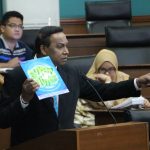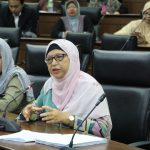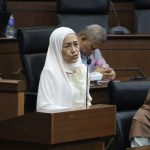By Mahadhir bin Monihuldin
GOMBAK, 14 January 2018: A roundtable discussion on the “The use of foreign textbooks in the Malaysian education system” which took place at the Senate Hall on Tuesday (9 January) had sparked a debate among scholars and intellectuals.
The discussion on the topic centred around the government’s new educational policy effective this year on the introduction of imported English textbooks instead of locally produced books for the use of preschoolers, Year One and Two pupils, and Form One and Two students.
Moderated by Assoc. Prof. Dr. Mohd Ridwan Abd Wahid, the discussion saw prominent individuals sharing their thoughts on the issue which included representative from the Institute of Teacher Education (IPG), Siti Bahijah Bakhtiar, President of the Malaysian English Language Teaching Association (MELTA), Prof. Dr. Ganakumaran Subramaniam, Professor of IIUMS Department English Language & Literature, Prof. Dr. Nor Faridah Abd Manaf, Professor at the Faculty of Languages and Linguistics at University of Malaya (UM), Prof. Dr. Zuraidah Mohd Don, and Professor at the Sustainability of Language Sciences Research Centre at Universiti Kebangsaan Malaysia (UKM), Prof. Dr. Supyan Hussin.
Siti Bahijah Bakhtiar shared that the move was part of the Education Ministrys effort to implement the new Common European Framework of Reference for Languages (CEFR) developed by the Council of Europe.
The CEFR will gauge foreign language proficiency and cannot be adopted by our education scheme unless the foreign English textbooks are introduced.
œWe want to achieve proficiency levels aligned with international standards through the CEFR, Bajijah said.
Siti Bahijah pointed out that the new foreign textbooks will allow students to read on more current contents because schools will receive updated textbooks every year or every few years as compared to the current practice where local textbooks are only replaced when there is a change in the syllabus.
Prof. Dr. Zuraidah from UM supported the move by saying that these foreign books would help expose students to cultures outside of the country which would further breed open-mindedness and general knowledge.
œWe need to understand the world out there to understand who we are, Dr. Zuraidah said.
However, on the other hand, concerns were raised about the foreign textbooks which scholars claimed specifically carried foreign contents without the local contents.
This they believe would create confusion among Malaysian students reading the books, especially those from rural areas who have not been exposed to the outside cultures.
On this, the President MELTA, Prof. Dr. Ganakumaran Subramaniam said, œYou cant bring to the students books they cant connect with and expect them to connect with it.
IIUMs Prof. Dr. Nor Faridah Abd Manaf echoed the sentiments expressed by Dr. Ganakumaran sharing her view that she felt Malaysians presupposed locally produced English textbooks were not of quality even though evidence might have showed the contrary.
œIt goes back to an inferiority mind-set that we have adopted from our history of being colonised.” Dr. Faridah said, adding that, “We need to decolonize our mind.
She argued that students have already learnt enough of global culture from the internet and that “our education system should do more to promote Malaysian culture and heritage”.
“A way forward in this issue is to have a team of local scholars from different backgrounds coming together to produce textbooks for the students,” Dr. Faridah said.
The foreign English textbooks that have been introduced recently are titled ˜Super Minds for primary school pupils, while another one is titled ˜Pulse 2′ for secondary school students.
The change is in tandem with the implementation of the Malaysia Education Blueprint 2013-2025 to reform English Language education in the country. ***





